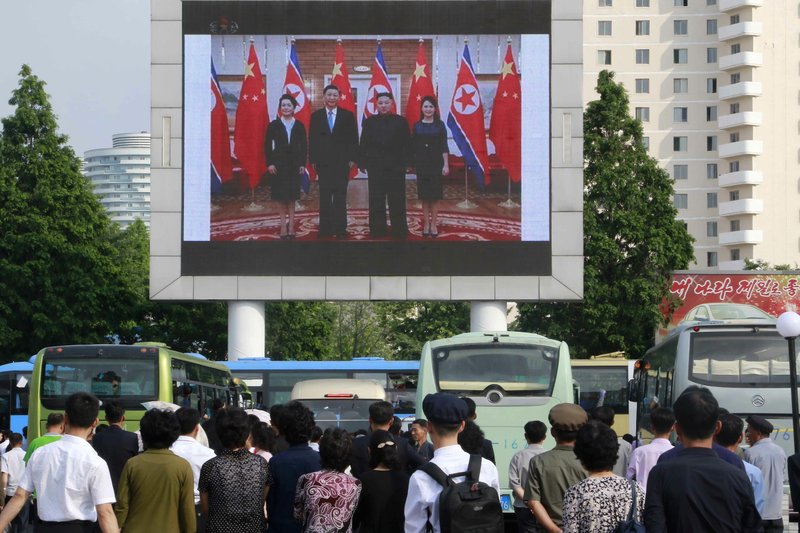BEIJING -- Chinese President Xi Jinping offered encouragement for North Korea's focus on economic development in a speech in Pyongyang, turning to a topic Beijing has long pressed with its communist neighbor amid wider concerns over the North's nuclear weapons program.
In an address at a banquet Thursday night, Xi noted that the nation under leader Kim Jong Un had "initiated a new strategic line of economic development and improving people's livelihoods, raising socialist construction in the country to a new high tide," according to China's official Xinhua News Agency.
Xi left North Korea on Friday afternoon, Chinese state media reported. An image posted on the mobile app of state broadcaster China Central Television showed people waving at his Air China Boeing 747 on the tarmac at the airport in Pyongyang.
Before leaving, Xi, accompanied by Kim and their wives, laid a wreath at a memorial to Chinese soldiers killed in the 1950-53 Korean War. China's intervention in the conflict prevented a rout of North Korean forces by troops from the U.S. and others under United Nations command.
"We will pass down the China-North Korea friendship from generation to generation, consolidate and develop the two countries' socialist cause, better enrich our citizens and advance regional peace, stability, development and prosperity," Xi was quoted as saying.
The North's long-moribund economy has shown some recent improvements, but it remains heavily dependent on aid -- mainly from China -- and food security is a constant concern. China has agreed to U.N. economic sanctions over the North's nuclear and missile programs but is wary of any measures that could push its economy toward collapse, potentially unleashing instability and chaos on its border.
Xi's speech also touched on the nuclear issue, saying all sides agreed to "stick to peace talks so as to make even greater contributions to peace, stability and prosperity in the region and the wider world," Xinhua said.
North Korean state media said Friday that Xi and Kim held broad discussions over the political situation surrounding the Korean Peninsula and reached a shared understanding on the issues they discussed. The Korean Central News Agency report did not give any specifics on the stalled nuclear negotiations between Washington and Pyongyang over disagreements in exchanging sanctions relief for disarmament.
"The supreme leaders ... broadly exchanged their opinions on the political situation of the Korean Peninsula and other serious international and regional issues," the Korean Central News Agency said. They assessed that deepening their relationship was in line with the "mutual interest of the two countries in face of serious and complicated changes in the environment and would be favorable for the region's peace, stability and development," it said.
In South Korea, the presidential Blue House welcomed Xi's visit to North Korea, saying it believes his talks with Kim will help promote peace and stability on the Korean Peninsula.
Kim told Xi on Thursday that he has not received a desired response from Washington and that the U.S. should meet North Korea halfway to "explore resolution plans that accommodate each other's reasonable concerns," according to Chinese state media.
Xi said his government is willing to play a constructive role in the denuclearization of the Korean Peninsula. "The international community expects the U.S. and North Korea to continue to talk and achieve results," Chine Central Television quoted him as saying.
His visit to North Korea was the first by a Chinese president in 14 years.
Information for this article was contributed by Hyung-jin Kim, Kim Tong-hyung and Yu Bing of The Associated Press.
A Section on 06/22/2019
